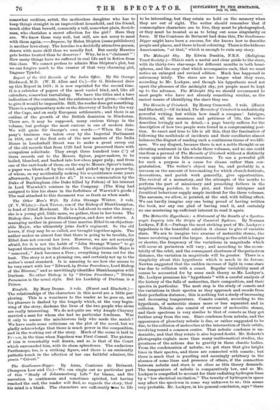Report of the Old Records of the India Office. By
Sir George Birdwood, M.D. (W. H. Allen and Co.)—Sir G. Birdwood drew up this Report in 1879 ; it is now reprinted for the second time. It is a calendar of papers of the most varied kind, and, like all calendars, somewhat tantalising. We have the titles and a bare indication of the contents, but the substance is not given,—indeed, to give it would be impossible. Still, the reader does get something. There is a supplementary note on the discovery of India by the way of the Cape, and on early European settlements ; and there is an outline of the growth of the British dominion in Hindostan. There are, it may be supposed, many curious things in the volume, but perhaps the most curious is one of modern date. We will quote Sir George's own words :—" When the Com- pany's business was taken over by the Imperial Parliament in 1858, one of the first acts of the new masters of the India House in Leadenball Street was to make a great sweep out of the old records that from 1726 had been preserved there with scrupulous solicitude. They swept three hundred tons (! !) of these records out to the Messrs. Spicer, paper-makers, to be boiled, bleached, and bashed into low-class paper pulp; and from one of the cart-loads of them, on the way to Messrs. Spicer's tanks, a paper was blown off by the wind, and picked up by a passer-by, of whom, on my accidentally making his acquaintance some years afterwards, I purchased it for £5." It was a renunciation by the Duke of Buckingham (the Duke killed by Felton) of his interest in Lord Warwick's venture in the Company. (The King had assigned to him his share in the forfeiture of Warwick's goods.) The seal attached to this document was as fresh as when made.


















































 Previous page
Previous page